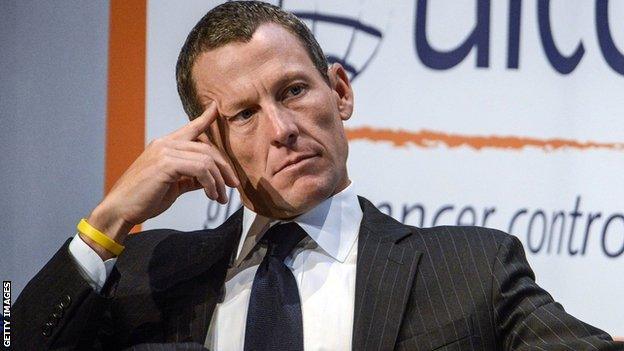Lance Armstrong refuses to be interviewed under oath by Usada
- Published

Lance Armstrong has said he will not agree to be interviewed under oath by the United States Anti-Doping Agency.
The American, 41, admitted taking performance-enhancing drugs during his seven of his Tour de France wins in an interview with Oprah Winfrey.
By speaking to Usada, the disgraced cyclist would have been eligible to have a lifetime ban reduced.
But a statement said he "will not participate in prosecutions... that only demonize selected individuals".
Armstrong was initially given until 6 February to meet Usada officials but was allowed a further two weeks to decide whether to be interviewed.
An agreement appeared close when Usada said he wanted to "assist in the effort to clean up the sport of cycling" when they agreed to the extension, although those hopes have been dealt a blow with the release of his statement.
The Texan's statement, released by his attorney Tim Herman, said he is willing to help with the investigation but will not be interviewed by Usada.
It added: "Lance is willing to cooperate fully and has been very clear: He will be the first man through the door, and once inside will answer every question, at an international tribunal formed to comprehensively address pro cycling, an almost exclusively European sport.
"We remain hopeful that an international effort will be mounted, and we will do everything we can to facilitate that result.
"In the meantime, for several reasons, Lance will not participate in Usada's efforts to selectively conduct American prosecutions that only demonize selected individuals while failing to address the 95% of the sport over which Usada has no jurisdiction."
Usada chief executive Travis Tygart said the agency will continue their investigation to clean up cycling without Armstrong.
In a statement, he said: "We have provided Mr Armstrong several opportunities to assist in our ongoing efforts to clean up the sport of cycling.
"Following his recent television interview, we again invited him to come in and provide honest information, and he was informed in writing by the World Anti-Doping Agency (Wada) that this was the appropriate avenue for him if he wanted to be part of the solution.
Lance Armstrong admits doping to win cycling titles
"Over the last few weeks he has led us to believe that he wanted to come in and assist Usada, but was worried of potential criminal and civil liability if he did so.
"Today we learned from the media that Mr Armstrong is choosing not to come in and be truthful and that he will not take the opportunity to work toward righting his wrongs in sport.
"At this time we are moving forward with our investigation without him and we will continue to work closely with Wada and other appropriate and responsible international authorities to fulfil our promise to clean athletes to protect their right to compete on a drug-free playing field."
Armstrong was charged by Usada in June 2012 with using performance-enhancing drugs.
He filed a lawsuit against the organisation the following month, accusing them of "corrupt inducements" to other cyclists to testify against him.
However, Armstrong then announced in August that he would not fight the doping charges filed against him, and was given a life ban by Usada and stripped of his Tour de France titles.
The findings were accepted by the International Cycling Union.
Armstrong, who retired from cycling in 2005 but returned to the sport between 2009 and 2012, has called for a 'truth and reconciliation commission' overseen by the World Anti-Doping Agency to look into the issue of doping in the sport.
- Published8 February 2013
- Published7 February 2013
- Published6 February 2013
- Published19 January 2013
- Published30 January 2013
- Published19 January 2013
- Published19 January 2013
- Published19 January 2013
- Published18 January 2013
- Published18 January 2013